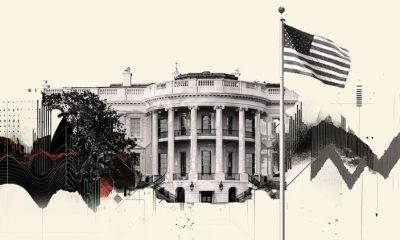
Technology
Restricting Chip Sales to China Could Backfire on US, Industry Group Says – Crypto News
The Biden administration’s potential curbs on sales of advanced semiconductors to China could undermine huge new government investments in domestic chip-making, the US chip-industry trade group said Monday.
The Biden administration is considering a raft of new curbs on the sale of chips to China, aiming to disrupt Beijing’s use of artificial intelligence for hacking and weapons development. At the same time, the administration is rolling out $39 billion in grants for new US chip-making plants after the passage of the Chips Act last year.
“Allowing the industry to have continued access to the China market, the world’s largest commercial market for commodity semiconductors, is important to avoid undermining the positive impact of this effort,” the Semiconductor Industry Association, the Washington, DC industry body, said in a written statement.
US chip companies have long argued that the government should carefully weigh the impact of export restrictions, because sales in China support investments in the US and help fund research that sustains their technological edge.
Chip companies, including the AI-chip leader Nvidia, have been lobbying the administration to refrain from stricter export controls after a ratcheting-up of tensions between the US and China that has centered on the semiconductor and electric-vehicle industries. Nvidia’s chief financial officer warned of a “permanent loss of opportunities for the US industry” in China if sales of AI chips were prohibited.
Restrictions the SIA described as overly broad, ambiguous and at times unilateral “risk diminishing the US semiconductor industry’s competitiveness, disrupting supply chains, causing significant market uncertainty, and prompting continued escalatory retaliation by China,” the SIA said. It called on the Biden administration to consult with industry before imposing more restrictions.
The US last October imposed some of the most stringent curbs yet on chips and chip-making equipment, requiring chip companies to seek licenses from the Commerce Department to sell some of their most advanced products to Chinese customers.
The measures are aimed at preventing US technology from advancing China’s military power.
Biden administration officials say they believe China is using US chips and related technologies to fuel the modernization of its military, including developing weapons of mass destruction, as well as to enable large-scale surveillance activities that lead to human-rights abuses.
China, in turn, has banned major Chinese companies from buying from US computer-memory company Micron, and recently imposed restrictions on exports of metals used in cellphone communication chips.
The Biden administration is now considering further restrictions that would snare AI chips that Nvidia developed for the Chinese market. It is also considering cutting off Chinese access to AI chips through cloud-computing companies. Biden is expected to restrict US investment in advanced Chinese chip-making, among other technologies, in a forthcoming executive order.
The industry push comes as the Biden administration tries to find new diplomatic openings with Beijing. Treasury Secretary Janet Yellen traveled to Beijing this month amid a flurry of visits by US officials, with limited signs of progress.
Numerous chip companies are planning large chip-making projects in the US after the passage of the Chips Act last year. Among them are Intel, Micron, Samsung and Taiwan Semiconductor Manufacturing Co., which together are plowing tens of billions of dollars into new plants that policy makers hope will help reverse the industry’s shift toward Asia in recent decades.
Write to Asa Fitch at asa.fitch@wsj.com
-

 Technology4 days ago
Technology4 days agoChatGPT users are mass cancelling OpenAI subscriptions after GPT-5 launch: Here’s why – Crypto News
-
Technology1 week ago
Binance to List Fireverse (FIR)- What You Need to Know Before August 6 – Crypto News
-

 Technology1 week ago
Technology1 week agoBest computer set under ₹20000 for daily work and study needs: Top 6 affordable picks students and beginners – Crypto News
-
Technology1 week ago
Beyond Billboards: Why Crypto’s Future Depends on Smarter Sports Sponsorships – Crypto News
-

 Technology1 week ago
Technology1 week agoGoogle DeepMind CEO Demis Hassabis explains why AI could replace doctors but not nurses – Crypto News
-

 others1 week ago
others1 week agoBank of America CEO Denies Alleged Debanking Trend, Says Regulators Need To Provide More Clarity To Avoid ‘Second-Guessing’ – Crypto News
-
others1 week ago
Japan CFTC JPY NC Net Positions down to ¥89.2K from previous ¥106.6K – Crypto News
-

 Cryptocurrency1 week ago
Cryptocurrency1 week agoHow to Trade Meme Coins in 2025 – Crypto News
-
Business1 week ago
Analyst Spots Death Cross on XRP Price as Exchange Inflows Surge – Is A Crash Ahead ? – Crypto News
-
others1 week ago
Pi Network Invests In OpenMiind’s $20M Vision for Humanoid Robots- Is It A Right Move? – Crypto News
-
Business1 week ago
Pi Network Invests In OpenMiind’s $20M Vision for Humanoid Robots- Is It A Right Move? – Crypto News
-

 De-fi1 week ago
De-fi1 week agoTON Sinks 7.6% Despite Verb’s $558M Bid to Build First Public Toncoin Treasury Firm – Crypto News
-
Cryptocurrency4 days ago
DWP Management Secures $200M in XRP Post SEC-Win – Crypto News
-
Business1 week ago
Is Quantum Computing A Threat for Bitcoin- Elon Musk Asks Grok – Crypto News
-

 Technology1 week ago
Technology1 week agoElon Musk reveals why AI won’t replace consultants anytime soon—and it’s not what you think – Crypto News
-

 others1 week ago
others1 week agoIs Friday’s sell-off the beginning of a downtrend? – Crypto News
-

 Technology1 week ago
Technology1 week agoOppo K13 Turbo, K13 Turbo Pro to launch in India on 11 August: Expected price, specs and more – Crypto News
-
Blockchain1 week ago
Shiba Inu Team Member Reveals ‘Primary Challenge’ And ‘Top Priority’ Amid Market Uncertainty – Crypto News
-

 Technology1 week ago
Technology1 week agoOpenAI releases new reasoning-focused open-weight AI models optimised for laptops – Crypto News
-

 Blockchain1 week ago
Blockchain1 week agoCrypto Market Might Be Undervalued Amid SEC’s New Stance – Crypto News
-

 Metaverse1 week ago
Metaverse1 week agoChatGPT won’t help you break up anymore as OpenAI tweaks rules – Crypto News
-

 De-fi6 days ago
De-fi6 days agoCoinbase Pushes for ZK-enabled AML Overhaul Just Months After Data Breach – Crypto News
-

 Technology4 days ago
Technology4 days agoHumanoid Robots Still Lack AI Technology, Unitree CEO Says – Crypto News
-

 others1 week ago
others1 week agoVisa and Mastercard’s Payment Dominance Not Threatened by Stablecoins, According to Execs – Crypto News
-
Business1 week ago
Breaking: U.S. CFTC Kicks off Crypto Sprint, Explores Spot and Futures Trading Together – Crypto News
-

 Cryptocurrency1 week ago
Cryptocurrency1 week agoLido Slashes 15% of Staff, Cites Operational Cost Concerns – Crypto News
-
others1 week ago
MetaPlanet Launches Online Clothing Store As Part of ‘Brand Strategy’ – Crypto News
-

 Technology1 week ago
Technology1 week agoiPhone users alert! Truecaller to discontinue call recording feature for iOS from September 30. Here’s what you can do… – Crypto News
-

 Technology1 week ago
Technology1 week agoiPhone users alert! Truecaller to discontinue call recording feature for iOS from September 30. Here’s what you can do… – Crypto News
-

 others7 days ago
others7 days agoUS President Trump issues executive order imposing additional 25% tariff on India – Crypto News
-
Business7 days ago
Analyst Predicts $4K Ethereum Rally as SEC Clarifies Liquid Staking Rules – Crypto News
-

 De-fi7 days ago
De-fi7 days agoSEC Says Some Stablecoins Can Be Treated as Cash, but Experts Warn of Innovation Risk – Crypto News
-
Business6 days ago
XRP Price Prediction As $214B SBI Holdings Files for XRP ETF- Analyst Sees Rally to $4 Ahead – Crypto News
-

 others6 days ago
others6 days agoEUR firmer but off overnight highs – Scotiabank – Crypto News
-

 Blockchain6 days ago
Blockchain6 days agoTrump to Sign an EO Over Ideological Debanking: Report – Crypto News
-

 De-fi6 days ago
De-fi6 days agoRipple Expands Its Stablecoin Payments Infra with $200M Rail Acquisition – Crypto News
-

 others5 days ago
others5 days agoRipple To Gobble Up Payments Platform Rail for $200,000,000 To Support Transactions via XRP and RLUSD Stablecoin – Crypto News
-

 Cryptocurrency4 days ago
Cryptocurrency4 days agoHarvard Reveals $116 Million Investment in BlackRock Bitcoin ETF – Crypto News
-
others4 days ago
SEC Latest Filing Reveal Ripple Case Win Could Trigger XRP Treasury Boom Like Ethereum – Crypto News
-
Business1 week ago
Major U.S. Banks Now pushing “Chokepoint 3.0” to Kill Crypto: a16z Partner – Crypto News
-
others1 week ago
United States CFTC Oil NC Net Positions climbed from previous 153.3K to 156K – Crypto News
-

 De-fi1 week ago
De-fi1 week agoRipple CTO Admits ‘Even Ripple Can’t Use XRPL DEX’ as XRP Faces Longtime Fan’s Scrutiny – Crypto News
-

 Technology1 week ago
Technology1 week agoInfinix GT 30 5G+ confirmed to launch in India on 8 August: Expected price, specs and more – Crypto News
-

 De-fi1 week ago
De-fi1 week agoEthereum Turns 10: Experts Say ETH Could Hit $40,000 in Next Decade as Network Matures – Crypto News
-

 Blockchain1 week ago
Blockchain1 week agoGENIUS Act Could Limit Stablecoin Appeal Amid Tokenization Boom – Crypto News
-

 Blockchain1 week ago
Blockchain1 week agoTrump CFTC Pick Brian Quintenz Questioned On Kalshi Ties – Crypto News
-

 Technology1 week ago
Technology1 week agoSolo Bitcoin miners keep winning against long odds – Crypto News
-

 Cryptocurrency1 week ago
Cryptocurrency1 week agoCrypto Rises Alongside Stocks as Fed Pivot Bets Build – Crypto News
-

 Blockchain1 week ago
Blockchain1 week agoBitcoin Uptrend Over? This Week’s Price Action May Hold The Key – Crypto News
-
Business1 week ago
Trump Says He May Announce Fed Chair Powell’s Replacement “Fairly Soon” – Crypto News










